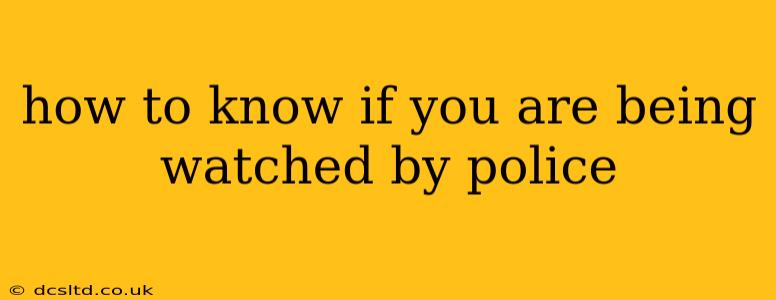How to Know if You Are Being Watched by the Police
Knowing whether you're being followed or surveilled by law enforcement can be unsettling. While there's no foolproof method to definitively confirm police surveillance, understanding common surveillance techniques and recognizing potential signs can help you assess the situation. This information is for educational purposes and should not be interpreted as legal advice.
It's crucial to remember that suspicion alone isn't sufficient grounds to conclude you're under surveillance. However, a pattern of unusual occurrences may warrant further investigation, perhaps by consulting with a legal professional.
Common Surveillance Techniques:
Law enforcement agencies utilize a range of surveillance methods, both overt and covert. Understanding these can help you recognize potential signs.
- Overt Surveillance: This involves open and visible observation. Officers might be in uniform or clearly identifiable vehicles parked nearby. This type of surveillance is generally legal as long as it doesn't violate other laws, such as unreasonable search and seizure.
- Covert Surveillance: This is more clandestine, employing techniques to avoid detection. Methods include unmarked vehicles, plainclothes officers, and electronic surveillance such as tracking devices or phone taps (requiring warrants in most jurisdictions).
Signs You Might Be Under Surveillance:
The following are potential indicators, but none alone definitively proves surveillance:
- Unmarked Vehicles: Noticeably unfamiliar cars, seemingly following your movements, especially if they maintain a consistent distance. Changes in driving patterns to match yours could be a strong indicator.
- Individuals in Plain Clothes: People who appear to casually observe you from a distance repeatedly, particularly if their presence seems out of place or their behavior is unusual.
- Frequent Encounters: Repeated chance meetings with the same individuals in different locations. This could suggest that they are strategically placed to observe your activities.
- Unusual Traffic Patterns: Sudden changes in traffic flow or the unusual presence of vehicles near your home, workplace, or other frequent locations.
- Technological Indicators: While this is harder to detect, you might notice unusual phone activity (e.g., dropped calls, unusually high data usage) or unusual behaviour from electronic devices.
What to Do If You Suspect Surveillance:
- Remain Calm: Panicking won't help and could potentially escalate the situation.
- Document Everything: Note down details like dates, times, locations, descriptions of vehicles and individuals, and any unusual events. This documentation could be crucial if you decide to consult with a lawyer.
- Vary Your Routine: Change your routes, your travel times, and your activities to make it harder to track your movements.
- Consult with a Lawyer: If you have genuine concerns about ongoing surveillance, legal counsel can advise you on your rights and how to proceed.
Are you being followed legally?
Law enforcement must adhere to legal guidelines and obtain warrants for many forms of surveillance, especially those involving wiretaps or electronic tracking. Illegal surveillance is a serious matter, but proving it is challenging.
What about private investigators?
Private investigators might also conduct surveillance, although again, many actions are legally regulated. The same principles of documenting observations and seeking legal counsel apply if you suspect private investigation.
How can I protect myself from surveillance?
Protecting yourself from surveillance is a complex issue and depends heavily on the type of surveillance involved. Consulting with a security expert could offer advice on specific measures. However, remember that some surveillance is perfectly legal and you may not have the right to completely avoid it.
This information is for general knowledge and should not replace legal advice. If you have serious concerns about surveillance, consult a lawyer. Understanding potential signs and taking precautions can help you feel more secure, but it's crucial to approach the situation with a clear head and seek professional advice if needed.
